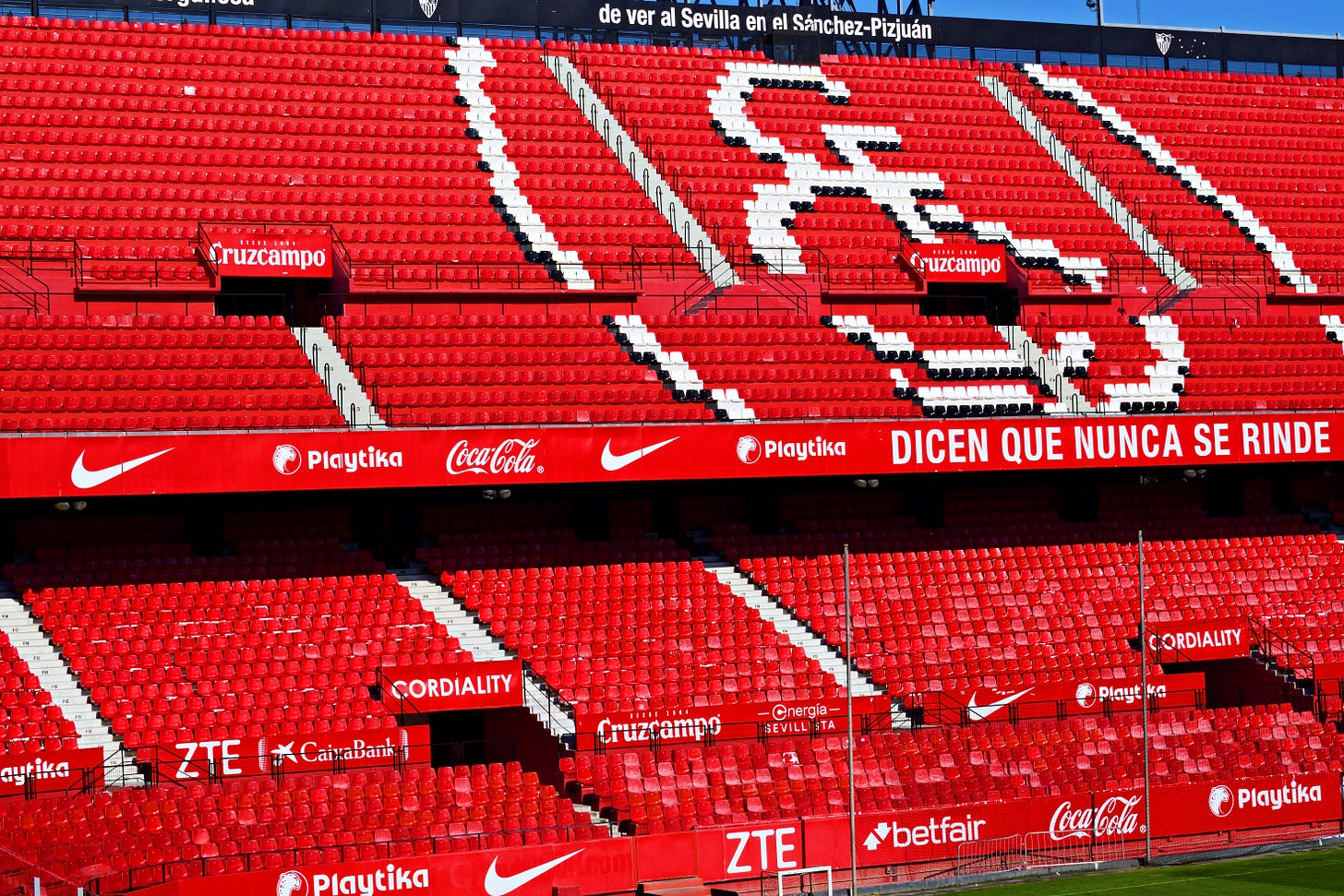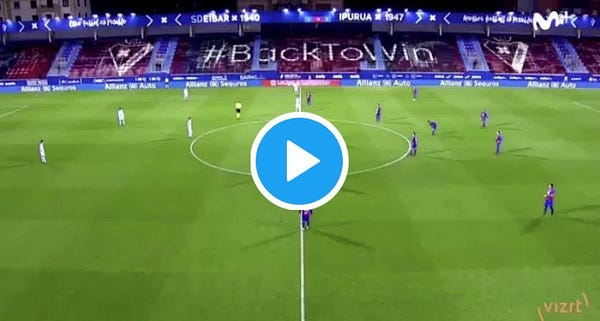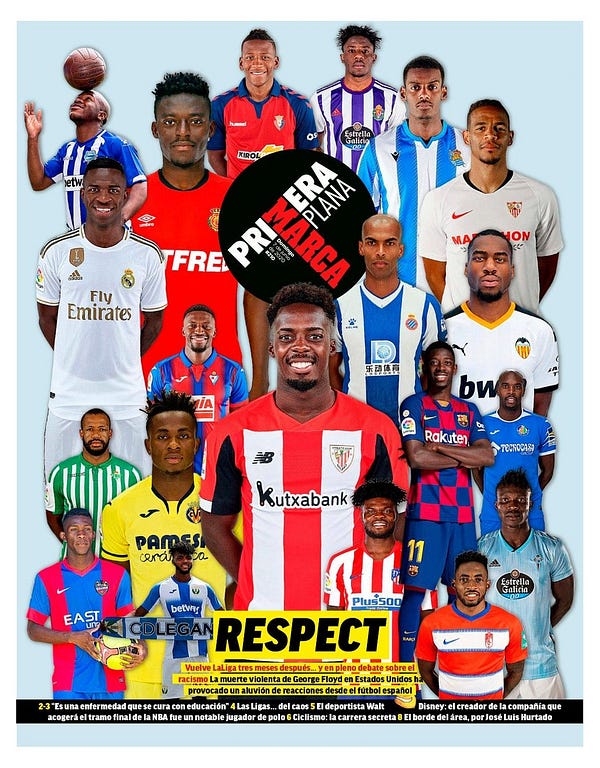It's not quite football. It's La Liga
The football was surprisingly good, but La Liga failed to send out a message of anti-racism following protests around the world

In an English advert for La Liga released a few years ago, a boy returns home from a trip to Spain. “It was great, but the locals are a bit mad,” the kid replies when his mum asks how it was, as he tells her about the endearing traditions surrounding Spanish football. “That can’t be football, that’s got to be something else.” The punchline for the campaign? It’s not football. It’s La Liga.
These days it’s hard to see that slogan as anything other than a gift for disgruntled Spanish football fans. As La Liga has geared up to its return these past few weeks, the debate has centred around what is and isn’t football. Supporter groups across the country displayed banners outside training grounds saying ‘No vuelve el fútbol, vuelve el negocio’ – football isn’t coming back, your business is. Rayo Vallecano fans living in a block of flats behind their stadium unfurled a message which read ‘Without fans, there is no football’ during their Segunda clash against Albacete on Wednesday night. Eibar manager José Luis Mendilibar put it succinctly on Spanish radio: “Football without fans isn’t football”.
Something returned on Thursday night with Sevilla’s derby against Real Betis, though. Yes, this was a weird new reality. That much was obvious from the substitutes spread out from each other in the empty stands of the Ramón Sanchéz-Pizjuan. The two presidents José Castro Carmona and Ángel Haro sat two seats apart in the gods, wearing club-branded face masks.
That’s without mentioning the virtual fans introduced by La Liga to try and make the experience more realistic for fans watching back home. Having consulted the makers of Fifa, the result was a mass of red-and-white in the stands with a murmur in the background to simulate the real crowd. You could picture the person responsible for the crowd noise turning a huge dial up and down from a control room whenever each side approached the goal.


The reception to Tebas’s bright new idea was understandably mixed. Some might argue the idea of 2D fans who don’t argue back is the president’s dream. I watched the Seville derby on a Spanish broadcast without the fake crowd, but having watched Friday’s games with the option the murmur did offer some semblance of normality.
Even without that, the volume of the game was noticeably louder than others behind closed doors. This was a proper derby, and there was no danger of mistaking this for a regular match. Both managers shouted instructions from their technical areas as if the 40,000-capacity stadium was full and there were strong challenges from the first whistle, with the intensity surprisingly high after such a long break.
Two of Spain’s most historic derbies – Seville’s Gran Derbi on Thursday and Valencia’s Derby del Turia on Friday – were always likely to produce the greatest shock for viewers in terms of both sets of colourful supporters being absent from the stadiums. But they would also provide the most comfort as near-constant fixtures in the history of Spanish football.
And for all the changes enforced by the virus, it was comforting to watch. To see Jesús Navas running down the wing as he has done so many times before, to see Nabil Fekir dribble past a few Sevilla players only to be thwarted by Julen Lopetegui’s well-drilled defence, even to see referee Mateu Lahoz make himself the star of the show once again with a dodgy call for Sevilla’s penalty. Some fans may even have been grateful to experience a long VAR-imposed break again before Gonzalo Melero’s equalising penalty for Levante against Valencia, although that seems unlikely.
By the time Lucas Ocampos’s neat back-heeled assist from a corner found Fernando’s head for Sevilla’s second goal, all hope of following the protocols disappeared. The Sevilla players rushed to the corner flag where they piled into a group hug with the masked substitutes. The co-commentator on Spanish TV seemed almost embarrassed: “Let’s just say that the protocol…”
The next day, Marca’s front page read ‘New football, old hugs’. It’s not quite football, but it’s La Liga.
Black Lives Matter conspicuous by its absence
Football does not exist in a vacuum, much as Javier Tebas might like it to. One of the discussions prior to La Liga’s return was how best to pay tribute to those who had lost their lives during the Covid-19 pandemic.
This was done in exemplary fashion. There was a minute’s silence to the victims of the pandemic ahead of each match, with players stood at a distance around the centre circle. In the 20th minute a round of applause was piped into the stadiums to honour the health workers who have worked tirelessly during the crisis, Tebas’s ‘infinite applause’ initiative.
The other all-encompassing story over the past few weeks was conspicuous by its absence. In the same week Premier League clubs pledged their support to Black Lives Matter by announcing shirt names would be replaced by the slogan while Juventus and Milan warmed up for their Coppa Italia semi-final clash with the message on their training tops, there was no mention of anti-racism in La Liga’s first few games.
There are questions to be asked about whether some of these gestures by big corporations are tokenistic. Certainly Juventus are not blameless given Moise Kean suffered racist abuse last season with his teammate Leonardo Bonucci saying the blame was “50-50” between the young striker and the Cagliari fans who targeted him. The statement issued by the Premier League seemed much more pointed and will surely lead to discussions among fans, particularly if their favourite players start taking a knee after scoring.
But even a small gesture is better than nothing. After all, it is not as if Spanish football is exempt from the conversation. Earlier this year Athletic Club striker Iñaki Williams suffered racist abuse for the second time in his career against Espanyol. Before that, there were the monkey chants and gestures directed at Levante’s Senegalese midfielder Papakouly Diop against Atlético Madrid in 2014. Before that, the banana thrown at Dani Alves by Villarreal fans which the Barcelona defender promptly picked up and took a bite out of. That sparked a campaign on social media, but it was short-lived.
Sevilla and Mali legend Frédéric Kanouté’s comments on the subject in an interview with BBC Sport were particularly revealing. “I don’t know what ‘Spanish football is racist’ means because it doesn’t mean anything,” he said. “Some Spanish people are racist, and it happens to be that they are in the football field. They can be supporters, they can be in the Federation, it can happen but it’s like a community. This is a society problem, not a football problem. If a society and a community is not doing enough against racism, it’s going to happen on the field, in the stadium.”
That societal issue becomes clear when you look at the rise of Vox, the far-right party who made huge gains in last year’s general elections and whose youth account posted a message saying ‘Spanish Lives Matter’ on social media in response to the murder of George Floyd. Tebas himself is among their most vocal supporters, and it has escaped nobody’s attention that the only match in the top two divisions to have been suspended for abusive chants so far was Rayo Vallecano’s game against Albacete in December, when forward Roman Zozulya was called a Nazi. The second half of that match was the first one back since the break on Wednesday night.
Beyond that, everybody should be under the spotlight. Marca’s front cover with the word ‘Respect’ surrounded by some of the league’s most recognisable black players was a start, but these are the same Spanish sports papers who label Real Sociedad and Sweden striker Alexander Isak the ‘black Ibrahimovic’ and Ousmane Dembélé the ‘mosquito’ for his supposed attitude problems at Barcelona.
Perhaps now is also the time to ask why Iñaki Williams is the only regular black starter for the Spanish national team since Marcos Senna was left out of the 2010 World Cup squad. For one of the most diverse leagues in the world, the whiteness of Spain’s team compared to England, France and Portugal is stark.
A gesture on the (re)opening night of La Liga would have sent out a message. Regardless, Spanish football still has a long way to go in its reckoning with racism.
Pick of the weekend’s games – Athletic Club vs Atlético Madrid, Sunday 13.00 BST
It’s crunch-time for Atlético, who find themselves in sixth place after a campaign of mixed fortunes. Their dogged victory over Liverpool in the Champions League gave them a timely boost before the break, but they will need all of those fighting qualities starting here in Bilbao. Athletic are at the back of the chasing pack in their own race for Europe in 10th place, and will miss their raucous San Mamés support. With Atlético reportedly set to lose €100m if they don’t qualify for the Champions League, it is crucial they start this 11-game sprint with their best foot forward.
Results from the past two days
Sevilla 2-0 Real Betis, Granada 2-1 Getafe, Valencia 1-1 Levante
Why not subscribe to our mailing list so you can get updates on La Liga sent directly to your inbox?
Image: Simona Bottone via Shutterstock







